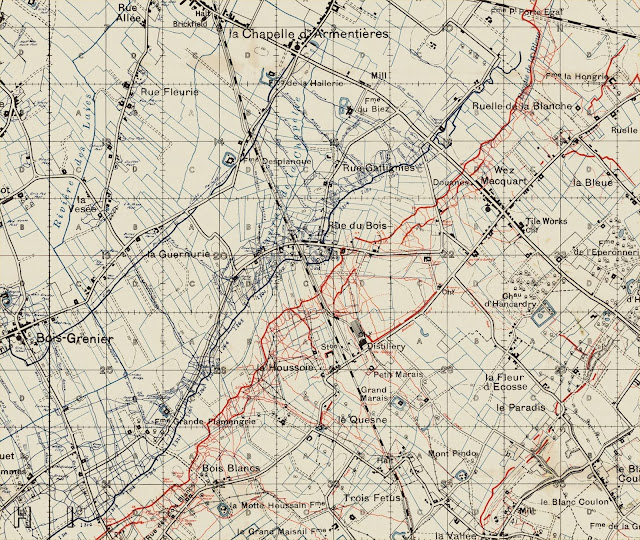The day was generally quiet, with some mist and light rain.
Overnight, the Battalion was ordered to carry out the raid on the German lines,
preparations for which had been in hand for some days. The raid was to be
overseen by 2IC Major Lewis Buchanan (see 1st
October 1915). The plan was for a party of three officers, Lt. Lavarack, Lt.
George Reginald Charles Heale (see 26th October 1915): and 2Lt. Christopher Snell (see 26th
October 1915) and 60 men from ‘C’ Company, who were in reserve in the Bois
Grenier Line, to advance through ‘B’ Company’s positions north of Farm Grande
Flamengrie (I.26.2) then through gaps in the German wire which had been created
by shelling a few days earlier (see 28th
January). They were to enter the German trenches with the object of killing
as many as possible, but also securing prisoners, documents and other
information. The raiding party was to remain in the German lines for no more
than five minutes and was to proceed no further than fifty yards from their
point of entry before returning to the British lines.
Conditions for the raid were ideal; the sky was starless but
fairly clear with only a little mist. At 9.15 pm two wire-cutting parties left
the British lines, with the main raiding party in position and the whole
Battalion, along with their counterparts from the Royal Scots, on stand-to. At
11 pm the wire-cutters returned, reporting that they had encountered a German
patrol of more than twenty men. This had prevented them from cutting the two
‘lanes’ through the German wire which were required for the raid to proceed. This eventuality had been planned for and the
orders issued included the instruction that, “Should a hostile working party be
found in front of enemy wire it will be attacked with vigour and driven in,
every effort being made to secure at least one prisoner”. Consequently a substantial party of thirty
men was despatched from the British lines to seek out and engage the German
patrol. However, this party returned at 12.35 am, having failed to locate any
sign of the Germans. At this point, with the men reported to be “very cold and
wet” and with the German wire having not been completely cut, the raid was
abandoned. It was recorded that, “the failure to carry through Scheme No.1 was
due to excessive caution on the part of our wire cutters who should have evaded
the hostile patrol. As no enemy working party was met with Scheme No.2 did not
come into operation”.
Pte. Arthur Gill (14980) joined the Battalion, having
been posted to France on 14th January. He was a 33 year-old barman;
originally from Stroud, he had been living in Leeds and was married, with two
daughters. He had originally served with 9DWR and had served two months (July
to September) in France in 1915 before being evacuated to England suffering
from haemorrhoids.
Pte. William Walton (see 25th September
1915), who had been wounded in September 1915, re-joined the Battalion.

No comments:
Post a Comment